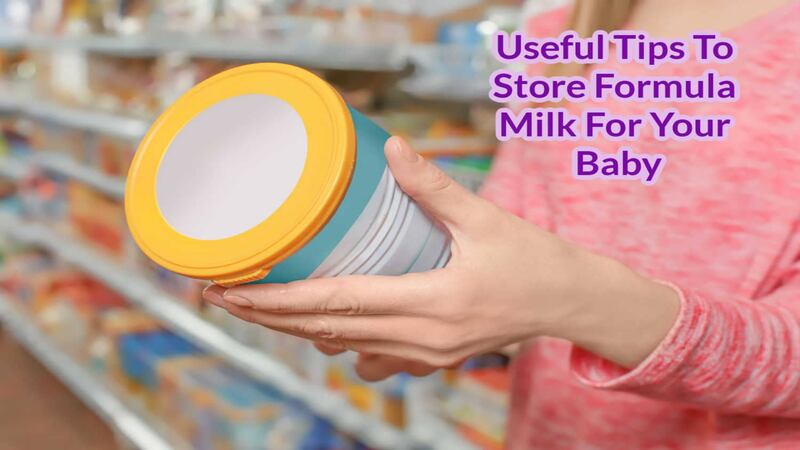
Parenting can be challenging, especially if you are a new parent. Feeding an infant properly is a mother’s primary responsibility. Though it is an established fact that there is no better alternative to breastfeeding, in some cases, breastfeeding might not go as planned. And that is when introducing formula milk becomes a must for a baby’s nutrition. As a mother, if you have decided to feed your baby formula milk, then certain questions might arise in your head as you may be unsure of a lot of things, like tips to store formula milk.
Preparing a formula is a task that needs to be done with vigilance and utmost caution. Unlike breast milk, this external mixture is prone to bacterial build-up and contamination. That is why care has to be taken at different stages of preparation and storage of formula milk. We have jotted down some well-researched tips to help you with your parenthood journey. Let’s have a look at them.
Top Tips to Prepare Formula Milk For Babies
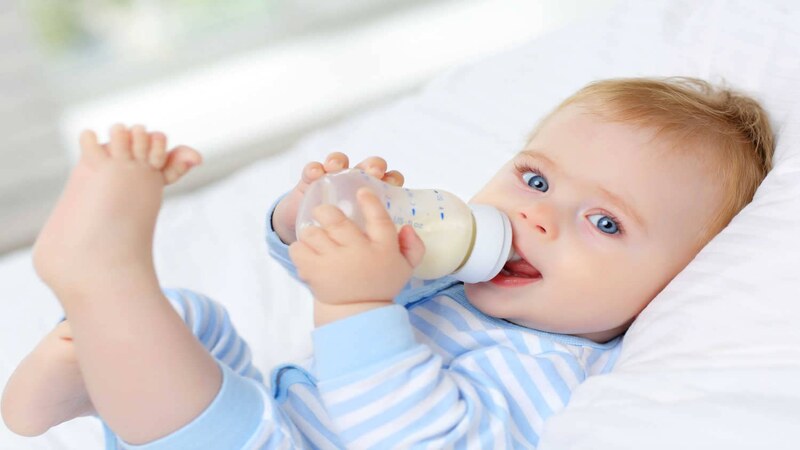
So, are you preparing formula milk for your baby? Here are a few tips that you must remember:
1. Be Sure To Wash Your Hands Thoroughly
Before preparing the formula, wash your hands thoroughly with soap and water and dry your hands well. Clean and sanitize the area where you prepare the infant formula (1).
2. Read The Product Label For Preparation Instructions
Infant formula can be in the form of powder, ready-to-feed liquid, or concentrated liquid. Make sure you read the product label carefully for instructions on preparation.
3. Sterilize The Bottles
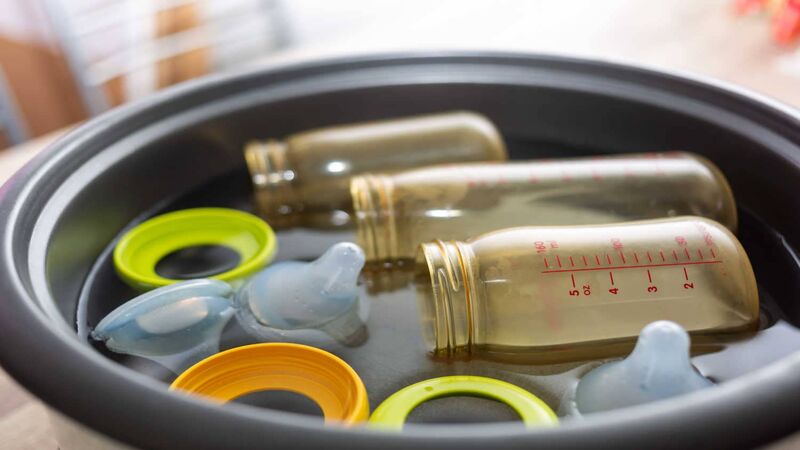
Sterilize and clean the bottles, nipples, caps, and rings if using for the first time.
You can follow any of the below-mentioned methods for sterilization:
- Boil the bottles in the water for five minutes.
- Use an automatic electric steam sterilizer.
- Use microwave steam sterilizer bags.
- You don’t need to sterilize the bottles after first use. Ensure you clean the bottles with soap and hot water after every use. You can also clean the bottles in a dishwasher (2).
- After cleaning, place the bottles and their accessories in a paper towel or dish towel in a protected area and let it air dry.
4. Avoid Using a Microwave For Warming
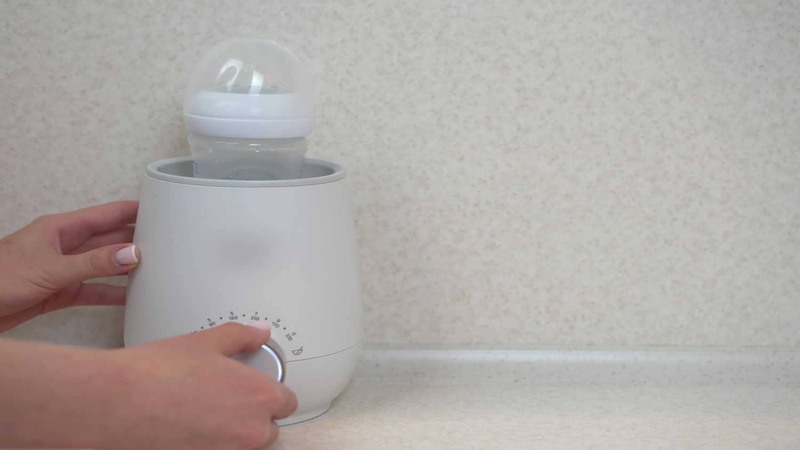
Baby milk does not need to be warmed before feeding. However, many parents prefer warming the bottle Do not use a microwave for warming because microwaves heat milk and food unevenly and can form ‘hot spots’ that can burn your baby’s mouth (3).
A bottle warmer is a convenient device designed to heat baby milk to the ideal temperature quickly and safely. It works by gently warming the milk to prevent overheating and preserve nutrients.
5. Use Good Water
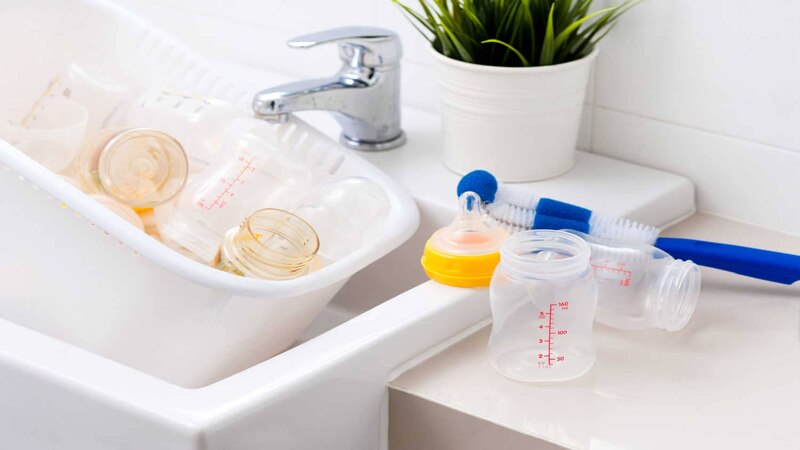
When preparing formula milk, people often focus heavily on the powder, bottles, and storage requirements, but they may forget to ensure that the water they are using is safe and healthy.
- Next time you prepare a formula, remember to check the water quality.
- Always refill your kettle with fresh running water instead of reboiling the same water multiple times.
- The water should be boiled at 70 degrees Celsius and then cooled for no more than half an hour.
- Additionally, store the water in an airtight flask to prevent contamination.
Top Tips to Store Formula Milk for Babies
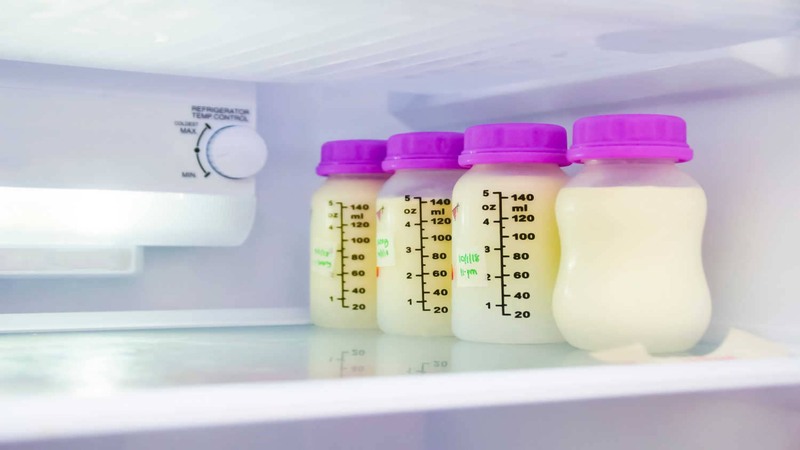
When preparing formula milk, it is essential to pay attention to the powder, bottles, and storage requirements. Careful storage of infant formula milk is crucial. Follow these tips for proper storage of formula milk:
1. Do Not Store Prepared Formula Milk
Prepared formula milk can go bad if stored at room temperature. Many parents prepare fresh formula just before feeding the baby. Remember, once you prepare the formula milk, use it within 2 hours of preparation and one hour after you begin feeding (4).
If you know your baby eats every 3-4 hours, you can also prepare the formula milk ahead of time and store it immediately in the refrigerator. You make 6-8 bottles to last all day.
2. Label Each Bottle
If you are using several bottles of infant formula, label each bottle with the date and time of preparation.
3. Complete Feeding The Whole Formula In One Go
Once you start feeding from a bottle, ensure to complete feeding the whole formula in one go, or if there are any leftovers, throw them away immediately. The combination of used infant milk left in the bottle and your baby’s saliva can form bacteria. Hence, clean and sanitize the bottle thoroughly before using it for the next time.
How to Know if Formula Milk Has Gone Bad?
The most obvious way to check whether the milk has spoiled is to smell it. Freshly prepared formulas generally have a neutral smell. The formula that has gone bad can emit a sour, rancid, foul, moldy, or musty odor. Moreover, the liquid might look clumpy or separate if it’s a ready-to-use or powdered formula.
Infant formulas get spoiled if stored improperly and are exposed to air, moisture, extreme heat, or cold.
Precautions to Take When Preparing and Storing Formula Milk
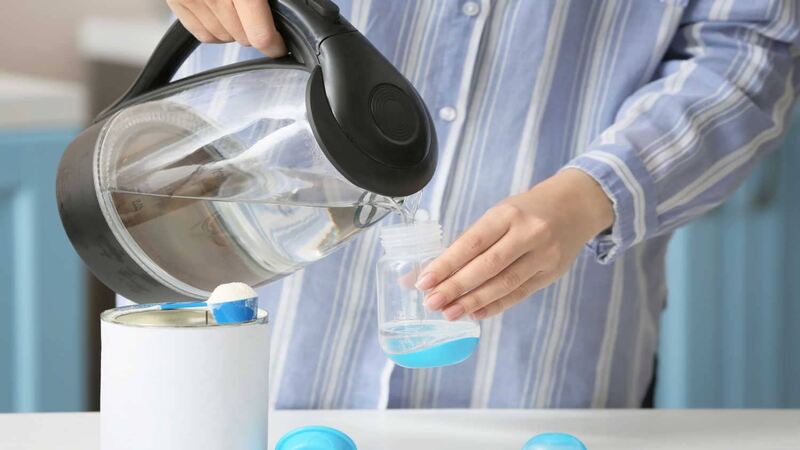
A little mindfulness, care, and proper attention to detail can earn your infant a healthy life and peace of mind. Here are some precautions to take when preparing and storing formula milk:
- Always check the expiration or the ‘use by’ date on the container of the formula. Avoid buying an expired or unsealed infant formula.
- Before preparing the formula milk, please wash your hands and dry them. Clean the place where you prepare the formula milk (5).
- While preparing the formula milk, always use the amount of water listed on the instructions of the formula container. Always use clean and filtered water to prepare the milk.
- Store unopened infant formula containers in cool, dry, and protected places—not outdoors or in the car.
- You should use the infant formula within 1 month of opening the container. We recommend you write the opening date in the container to keep track of the time (6).
- If you warm the bottle by placing it under warm running water, ensure that no water gets into the nipple or the bottle. Check if the milk is too hot while placing a few drops on the back of your hands.
The formula is a choice of many new moms, but the way you feed it to your baby is what is going to differentiate you from the other moms. We hope these tips will help with the storage of formula milk for your babies.
FAQ’s
1. How Long Can I Use Formula Milk After Preparation?
Once you have prepared the formula milk, use it within 2 hours of preparation and 1 hour of the beginning of feeding. Once you start feeding the formula milk, if you have any leftovers, discard them immediately. Infant formula mixed with the baby’s saliva can lead to the growth of harmful bacteria.
2. How Long Can I Store Formula Milk After Preparation?
If you want to prepare the infant formula ahead of feeding and store it, we recommend you store the unused formula milk bottles in the refrigerator. Make sure you use the milk within 24 hours of storage. Discard any ready-to-use formula milk stored in the fridge for 48 hours or more.
3. How Long Will Formula Milk Be Good When Left at Room Temperature?
Prepared infant formula can be stored at room temperature (77°F or cooler) for a maximum of 2 hours after preparation, and for 1 hour after feeding your baby has started.You can store the prepared formula in the refrigerator (40°F or cooler) for up to 24 hours. Never freeze the infant formula.
References
- Hailey Nelson, MD, FAAP, IBCLC, Complex Care Pediatrician, Valley Children’s Hospital, Madera, California – https://www.healthychildren.org/English/tips-tools/ask-the-pediatrician/Pages/how-long-can-baby-bottles-sit-at-room-temperature.aspx
- Mayo Clinic, Infant formula: 7 steps to prepare it safely – https://www.mayoclinic.org/healthy-lifestyle/infant-and-toddler-health/in-depth/infant-formula/art-20045791
- U.S. Food and Drug Administration – https://www.fda.gov/food/people-risk-foodborne-illness/once-baby-arrives-food-safety-moms-be#:
- CDS, U.S. Department of Health & Human Services – https://www.cdc.gov/nutrition/infantandtoddlernutrition/formula-feeding/infant-formula-preparation-and-storage.html#:
- Medically reviewed by Melanie L. Pitone, MD – https://kidshealth.org/en/parents/formulafeed-storing.html
- Victoria State Government, Department Of Health – https://www.betterhealth.vic.gov.au/health/healthyliving/bottle-feeding-nutrition-and-safety

